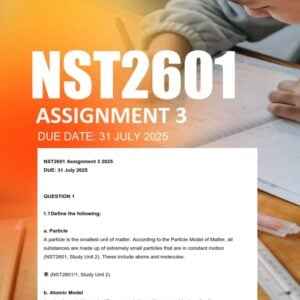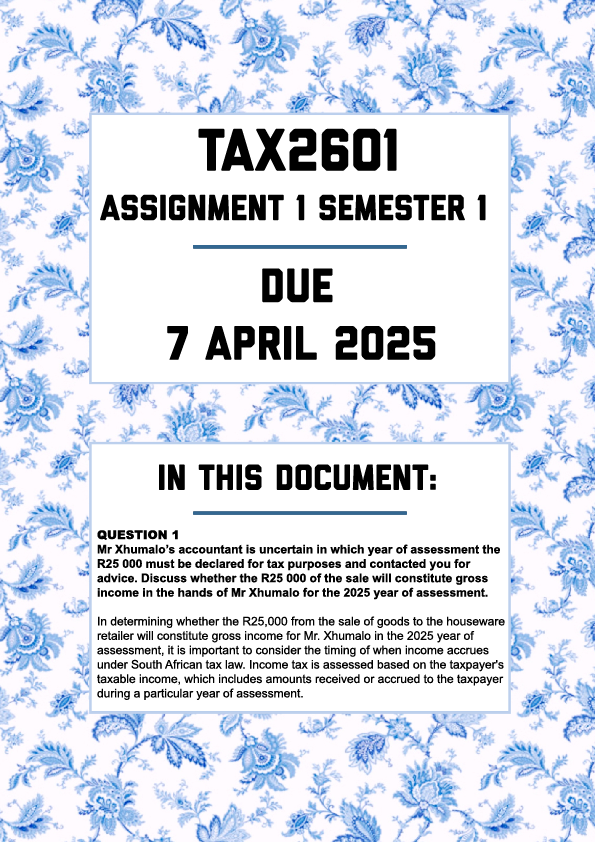Description
TAX2601 Assignment 1 Semester 1 | Due 7 April 2025. All questions answered. QUESTION 1 (12 marks, 14 minutes)
Mr Xhumalo lives in Gqeberha, South Africa. He manufactures and sells various grass baskets and placemats from a street stall. Due to the high demand for his products, he concluded a sales agreement with a well-known houseware retailer in South Africa. In terms of the agreement, the retailer will purchase R25 000 worth of products from Mr Xhumalo on 15 February 2025 on credit. The goods must be manufactured and delivered by 15 March 2025, with payment scheduled for 31 March 2025. The agreement clearly states that Mr Xhumalo will only become entitled to payment once he has delivered the goods.
Mr Xhumalo’s accountant is uncertain in which year of assessment the R25 000 must be declared for tax purposes and contacted you for advice.
REQUIRED
MARKS
Discuss whether the R25 000 of the sale will constitute gross income in the hands of Mr Xhumalo for the 2025 year of assessment.
Note:
• You can support the main issue in the question with relevant case law from the module’s prescribed case law.
12
QUESTION 2 (12 marks, 14 minutes)
Hlumelela (Pty) Ltd is not a small business corporation as defined in the Income Tax Act. The company’s year of assessment ends on 31 March, and its records reflect the following:
Year of assessment
Taxable income
Date of assessment
2025
R1 784 432
(Estimated – not yet assessed)
2024
R1 354 980
15 September 2024
2023
R1 200 000
4 April 2023
REQUIRED
MARKS
(a)
Calculate the first and second provisional tax payments for Hlumelela (Pty) Ltd for its 2025 year of assessment to ensure that the company does not incur any underestimation penalties.
Note:
• Provide a reason for all the amounts used, explaining whether they may be used as the basic amount, and specify any adjustments made (if any) calculating the basic amount.
• Clearly indicate on which date the payments must be made.
9
(b)
Calculate the basic amount for the first provisional tax payment for the 2025 year of assessment, on the assumption that the 2024 assessment was issued on 20 September 2024.
Note:
• Provide a reason for your answer.
QUESTION 3 (36 marks, 42 minutes)
Yelanga (Pty) Ltd (Yelanga) is a company that trades as a manufacturer of solar panels in South Africa and is not a small business corporation as defined in the Income Tax Act. The company imports most of the components for its manufacturing process from China. The company commenced trading in 2021 and has a 28 February financial year-end.
The accountant of Yelanga is uncertain about the correct income tax treatment of certain transactions and requested your assistance with the transactions listed in notes 1 – 7 below. The taxable income of Yelanga for the 2025 year of assessment (before taking the information provided below into account, unless stated otherwise) amounts to R20 230 000.
1. Trading stock
The trading stock of manufactured solar panels (finished goods) has been correctly accounted for in the taxable income of R20 230 000. However, the accountant was uncertain whether the imported parts used in the manufacturing process must be included in the calculation of the taxable income and, if so, at what values they should be recorded.
The following extract from the financial records is available:
R
Parts for manufacturing solar panels:
Cost price of purchases of imported parts during the 2025 financial year
12 760 000
Opening stock on 1 March 2024 @ cost price, including import duties
11 865 000
Opening stock on 1 March 2024 @ cost price excluding import duties
11 640 000
Opening stock on 1 March 2024 @ market value (*note)
11 720 000
Closing stock on 28 February 2025 @ cost price, including import duties
11 785 000
Closing stock on 28 February 2025 @ cost price excluding import duties
11 624 000
Closing stock on 28 February 2025 @ market value
11 872 000
* Note – Some parts included in closing stock consisted of “outdated technology”.
In June 2024, Yelanga donated solar panels with a manufacturing cost of R200 000 and a market value of R300 000 to a local children’s home. The children’s home is a registered Public Benefit Organisation in terms of both Part I and Part II of the Ninth Schedule of the Income Tax Act, and Yelanga received a valid section 18A certificate for this donation on 30 June 2024. The donation was made solely with charitable intentions, and Yelanga did not receive any advertising or promotional benefit in return. (You must assume that the manufacturing cost of the donated solar panels has already been deducted in the taxable income calculation of R20 230 000 in terms of the general deduction formula).
At the end of the previous year of assessment, Yelanga had a balance of R52 000 in qualifying section 18A donations that were not deducted due to the annual limitation in a previous year of assessment.
QUESTION 3 (continued)
2. Insurance
On 1 December 2024, Yelanga renewed its annual short-term insurance contract (Contract A) which provides insurance cover for the business and all its assets against losses due to fire, theft and destruction for a period of 12 months. The full insurance premium of R565 000 was paid in advance on the inception of the contract on 1 December 2024.
However, on 28 January 2025, Yelanga was notified that the insurance company had been placed under liquidation. As a result, no services would be provided, and no refund of the premium paid would be received. Yelanga urgently entered into a new short-term insurance contract (Contract B) with a different insurer. On 31 January 2025, Yelanga paid R594 000 for short-term insurance cover for the period 1 February 2025 to 31 January 2026. (Provide a brief reason)
3. Rent paid for warehouse
In preparation for the planned construction of a new factory building, Yelanga entered into a lease agreement with the warehouse owner to rent warehouse space for storing finished products near the construction site. The lease agreement was for a 12-month period, commencing on 1 August 2024. Since Yelanga had excess cash available, the company decided to pay the full 12 months’ rent on 1 August 2024. The full rental amount for the 12-month lease period amounted to R900 000. (Provide a brief reason)
4. Employee remuneration
The following information is available from the financial records of Yelanga:
R
4.1 Net salaries and wages paid to employees
3 832 000
4.2 Pension fund contributions deducted from salaries and paid to pension funds
282 000
4.3 Pension fund contributions contributed for the benefit of the employees to pension funds (company contributions)
375 000
4.4 Loan made to an employee who absconded from Yelanga’s employment. The loan was written off as irrecoverable on 28 February 2025. (Provide a brief reason)
90 000
4.5 Employees’ tax (PAYE) deducted from gross salaries and paid over to SARS (Provide a brief reason)
867 000
5. Traffic fines paid
Yelanga’s cost accountant determined that, due to high fuel prices, it is more cost-effective to overload the delivery trucks and exceed the weight limit on national roads, as the expense of paying fines is lower than the cost of purchasing and operating additional delivery trucks. Consequently, Yelanga has paid R135 000 in traffic fines during the 2025 year of assessment. The accountant argues that these fines are a necessary concomitant of the business of Yelanga, incurred in the production of income and not of a capital nature. Therefore, it qualifies as a deduction in terms of the general deduction formula. (Provide a brief reason)
6. Expenditure relating to patents
On 1 November 2024, Yelanga paid R285 000 for the extension of the patent term used in its manufacturing process for an additional 12 months.
QUESTION 3 (continued)
7. Provisional tax payments (Provide brief reasons)
Yelanga made the following two provisional tax payments during the 2025 year of assessment:
• First payment amounting to R55 000 was only made on 5 September 2025.
• A late submission penalty of R5 000 was also paid on 5 September 2025.
• Second provisional tax payment amounting to R21 000 was made on 28 February 2025.
REQUIRED
MARKS
(a)
Calculate Yelanga (Pty) Ltd’s taxable income for its 2025 year of assessment.
Notes:
• Ignore any capital gains tax consequences.
• Show amounts that are deductible in terms of different sections of the Income Tax Act in separate lines in the answer.
• Assume that Yelanga will utilise any available options in terms of the Income Tax Act to legally minimise its normal tax liability.
• Provide brief reasons for any amount that is not taxable or not deductible.
• Also, provide brief reasons in the body of your calculation (not as a separate note elsewhere in your answer) for the treatment of transactions 2, 3, 4.4, 4.5, 5 and 7.
32
(b)
Assume that Yelanga (Pty) Ltd is, in fact, a small business corporation (as defined in the Income Tax Act), and its taxable income for the year of assessment ended 28 February 2025 amounted to R652 000.
Calculate the normal tax liability of or refund due to Yelanga (Pty) Ltd for the 2025 year of assessment.
Also, indicate whether Yelanga must make a third (top-up) provisional tax payment for the 2025 year of assessment and the date by which the payment must be made to avoid incurring any interest, assuming that the assessment will only be issued in December 2025.




















Neo Mashaba –
⭐⭐⭐⭐⭐